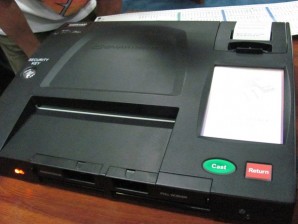PCOS machines breakdown ‘widespread,’ claims poll watchdog
MANILA, Philippines—The poll watchdog Kontra Daya said cases of malfunctioning precinct count optical scan (PCOS) machines were “widespread,” leading to voting delays in various parts of the country on Monday.
“The PCOS malfunctions reported today were widespread and had a major effect on the conduct of the elections,” Kontra Daya said, citing initial reports from its volunteers to its monitoring center at the National Council of Churches in the Philippines in Quezon city.
The watchdog group did not release exact figures of how many PCOS machines malfunctioned and how many were eventually repaired or replaced. In a 6 p.m. statement, the group said around 60 percent of poll problems monitored were related to the malfunctioning PCOS machines.
A tally made by the Inquirer using the updates released by Kontra Daya via its Twitter account and website showed there were about 170 voting centers where PCOS machines malfunctioned between 7 a.m. and 7 p.m.
Some of the voting centers had up to three PCOS machines reported to have malfunctioned.
At Star High School in Barangay (village) Bagong Silang, Caloocan City, and in Barangay Tugbok, Compostela town, Compostela Valley province, Kontra Daya got reports that PCOS machines only worked after the boards of election inspectors (BEI) snipped the “oversized” ballots.
Some BEIs in Baguio City and Iloilo City used sticks to free the PCOS machine ballot slots from paper jams, it said.
Most common
In Metro Manila, the group said the most common problems reported were PCOS machine shutdowns and jams, rejected ballots, back-up memory loss, printer malfunctions and corrupted compact flash and memory cards.
The group pointed out that this contradicted the claim of Commission on Elections (Comelec) Chairman Sixto Brillantes that PCOS problems were not that prevalent.
“Taxpayers paid P1.8 billion for these PCOS machines. The fact that we are seeing numerous cases of PCOS failures, malfunctions and delays only underscores the long-held observation that we were duped by Smartmatic. Comelec allowed the electorate to be shortchanged. This should be the last time we use these machines,” Giovanni Tapang, Kontra Daya co-convenor, said.
Kontra Daya said that the massive cases of PCOS problems “further affirm the accountability” of the Comelec and its foreign partner Smartmatic, the private vendor of the PCOS machines, for undermining the country’s elections through their deeply flawed automated election system (AES).
“In some cases, election inspectors had to be creative just to fix the technical problems encountered by the machines. We have monitored a report from Iloilo, for instance, that the BEI had to use a broom to help the PCOS machine accept the ballots. In other cases, the BEI had to trim the ballots so they will fit into the machine. This is unacceptable and Brillantes should not just dismiss the problem as minor hitches,” Kontra Daya spokesman Fr. Joe Dizon recounted.
Problems ‘marginal’
The Parish Pastoral Council for Responsible Voting (PPCRV) also had its hands full.
“There were many incidents we didn’t want to happen, like a grenade explosion and the military entering [polling precincts in] ARMM (The Autonomous Region of Muslim Mindanao),” said Ana de Villa Singson, PPCRV spokesperson.
But the Church-led watchdog withheld its overall assessment of the balloting as it awaited other volunteer reports from other provinces.
The bulk of reports involved malfunctions of PCOS machines in precincts in Batangas, Ilocos Sur, Laguna, and the cities of Pagadian, Caloocan and Quezon, among others.
“We have info that there were 400 PCOS machines that malfunctioned. But we don’t have a confirmed report how many of the 400 were eventually fixed and how many had to be replaced,” PPCRV Chair Henrietta de Villa said.
If true, De Villa said the figure was still marginal compared to the total number of machines used in precincts throughout the country.
“We have to know this so that people won’t lose trust [in the system], because 400 issues or machines that suffered some malfunction is not such a bad percentage against 77,889 machines used for the elections,” De Villa said.















